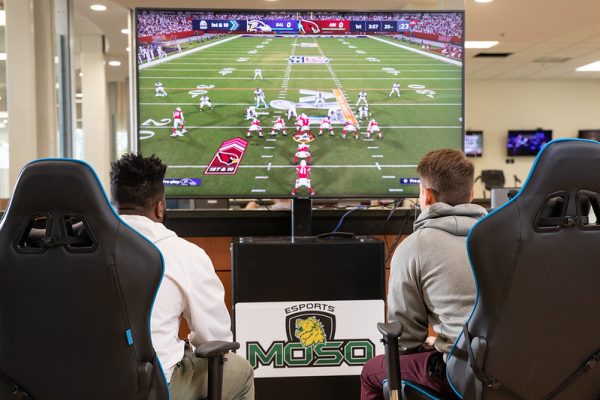Women In STEM
In 2018, officials with the National Girls Collaborative Project (NGCP) reported only 18 percent of women earn degrees in computer sciences and 19 percent in engineering.
There are several female students who are joining that statistic at Missouri Southern.
“I don’t think most women were told in high school especially, that different forms of computer science programs and majors are offered,” said Ashley Thomure, senior computer information systems major. “Even for men it feels like you need to be some genius to do it but honestly you just need passion.”
NGCP’S March 2018 research of women in science, technology, engineering, and math (STEM) indicated girls and boys typically fair the same when it comes to their K-12 scores, but with one major difference: interest and confidence levels.
“From a very young age, most girls are pushed into other fields,” said Tabitha Beverly Gray, industrial engineering technology major. “It’s not always blunt and sometimes it’s really subtle, so it feels like it’s a very deeply ingrained way of doing things that is being chipped away.”
Gender disparities begin to appear by the time students enter college.
Based on studies conducted by the National Center for Science and Engineering Statistics (NCSES), the 2017 National Science Foundation report indicated women have received 57 percent of all undergraduate degrees since the 1990s, but participation in each STEM field varies.
Most women are flocking to psychology, biological sciences and social sciences rather than engineering, computer science and physics.
The key to maintain interest, according to Dr. Claudia Wilson, engineering professor, is to instill the fundamentals at a young age.
She compared it to reading: if the skill is not picked up early, it becomes harder to learn the older one becomes.
In turn, this becomes a key factor in recruiting new students to Southern.
In a trip to a Neosho junior high school, Wilson found younger students approach the science and math subjects differently because they are in their “exploratory phase.”
“If you are not getting a good fundamental math early on, you will always have this nagging insecurity that if math is involved, [you’re] going to suck at it,” said Wilson. “By the time they are 14, 15, or 16, that boat has sailed for us.
“If they have not gotten the fundamentals or fallen in love with it then, we will not make a change at that point.”
After graduation, the disparities become stretched out even more according to the NGCP reports.
Women make up 47 percent of the overall workforce and only 28 percent of STEM fields.
Reasons behind this vary from family to a lack of opportunities.
Howe and Wilson agree a solid support system can make a difference for both women and men.
“Any person who has a child or multiple children with both spouses that are working is tough, especially without a support system,” said Dr. Elke Howe, engineering department chair. “I think everyone struggles with that.”
Howe said women can flourish in these career fields.
An estimated 15 percent of students in the department are women.
Last fall, for the first time there was an all-female group for the 300 level CNC Project course, where the women made up six out of 16 students. Wilson said this was the highest the class has seen.
Also, every officer in Southern’s Society of Manufacturing Engineers are women.
Howe said women are natural leaders and can thrive in the field because of an ability to lead others in meetings and projects.
“Women are natural problem solvers,” said Howe.
Engineering faculty discuss careers, personal experience
Two of the three engineering faculty at Southern are women, and they are both from Germany. Howe is from Worms and Wilson is from Pirna.
Howe has been at Southern since 2001 and Wilson since 2007.
“It’s really unusual though, that we have two female instructors and one male instructor,” said Howe.
Howe worked in the plastics engineering field before coming to Southern in 2001. After studying chemistry in Germany, she landed a job in the plastics engineering field.
At Southern she advises and teaches students involved in the industrial engineering technical degree program.
“Industrial engineering technology is a wonderful major for women,” said Howe. “I think women can thrive in it, because you help people make processes better.
“I get personal satisfaction out of accomplishing that I can improve a system and make somebody’s life better.”
Wilson became exposed to the world of science at the age of eight, when she would shadow her mother who, in the 1950s, was a quality control material science tester for a company that tested airplane parts.
“They were looking at how materials behaved under particular strengths, particular thermal exposure, and then they had metallurgical pictures to look under the microscope and it was just a whole new world that opened up.”
In her 20s, Wilson worked for FAG Bearings Company in Tennessee.
“Me being a German in Tennessee in the aluminum factory with a heavy accent gave rise to some very interesting conversations,” said Wilson. “I didn’t understand that a redneck joke is not a joke, but a fact of life stated in a funny way. Looking back at it, I think there was a severe culture clash between German culture and Tennessee. That was an adjustment that was needed.”
Both Howe and Wilson agree that they never felt discriminated against in the workplace.
“I’ve had really nice opportunities and I hope they were because of my credentials,” said Howe.
Your donation will support the student journalists of Missouri Southern State University. Your contribution will allow us to purchase equipment and cover our annual website hosting costs.

























